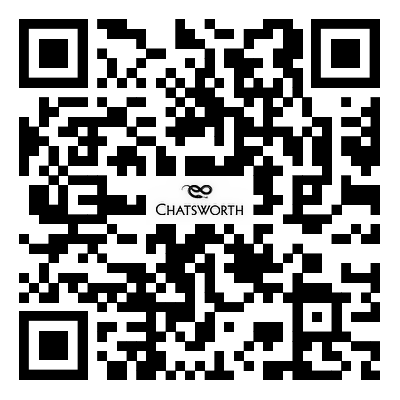There are thousands of books in the Library: works on science, history and geography, books in Latin, German and French, ornate religious texts, folios of poetry, hefty studies of architecture; all stand to attention on their shelves in the Chatsworth Library; all wait patiently to have their story told. And yet, unknown to many, there’s also a whole collection of books that never strictly existed but nevertheless have a history to reveal.
This ‘invisible library’ of Chatsworth contains over 100 such works. They have authors, many of them recognisable, and titles, many of them probable enough, but they are products of the imagination, not the pen. There is nothing inside, not even blank pages. It is a library of ‘fake’ books, or rather fake titles for there are no books to speak of, only spines.
The idea for an ‘invisible library’ at Chatsworth was well-formed in the mind of the 6th Duke of Devonshire when, in 1831, he requested the assistance of the writer, poet, engraver and king of the pun, Thomas Hood, to come up with some amusing names for the ‘unreal folios, quartos and duodecimos’ that would fill the fake bookcases of his library. The Duke had seen this done elsewhere but wanted to improve on what he dubbed ‘the tired old labels’. Over the next year Hood provided a list of over 70 fake titles. These were supplemented by ideas from the Duke’s friends and probably himself as he was given to joking and punning. From this store of ideas over 90 titles were commissioned and placed on the fake shelves where they remain to this day.
Some of the humour of these titles has aged somewhat (or was never that funny to begin with!). Other titles become amusing only when the cultural context of the early nineteenth century is understood and explained. Most, thankfully, remain immediately comprehensible and their ability to make us chuckle reveals how little our language and sense of humour has changed in 180 years.
Life of Ketch, with Cuts of his own Execution – Jack Ketch was a famous executioner, who famously dispatched the 1st Duke of Devonshire’s friend and political ally, William, Lord Russell.
John Knox, On Death's Door – Reads perfectly without explanation but it is well worth imagining John Knox, protestant clergyman and leading light of the Scottish Reformation, approaching his fate with trepidation.
Percy Vere – in 15 large volumes
To hold these fake titles, fake bookcases were crafted and placed at each end of the library. They conceal doorways but there are no Priest holes or Batcaves beyond. Instead they give access to stone stairs that lead to the library gallery above.
The idea of inventing amusing, fake titles for books is nearly as old as books themselves. However, the practice of crafting an actual fake bookshelf for the purpose of amusement, and not just the concealment of clergy, fugitives or contraband appears to have become commonplace in the mid-late nineteenth century. A particularly famous example of this practice was the ‘invisible library’ commissioned by Charles Dickens for his home at Tavistock Place in 1851.
In the early 1960s Duchess Deborah decided to construct another secret doorway and bookcase at the opposite end of the library, in an effort to improve upon the ‘rather laboured jokes’ of the Victorian-era fake bookcases. The comptroller and house carpenter were tasked with the construction, but ideas for the books themselves were volunteered by a family friend, Patrick ‘Paddy’ Leigh Fermor.
Fermor, the ghost writer in question, was a war hero and travel writer. His independent streak and thirst for youthful adventure saw him walk from Holland to Istanbul before the outbreak of the Second World War. During the conflict he was stationed as an Intelligence officer in Crete and, after its occupation, organised some of the guerrilla operations on the island. One operation famously involved the mission to kidnap the General Kriepe, the German officer in command of the island.
After the war, Fermor found fame as a travel writer with a gifted prose style and established a long-standing friendship with both the Duke and Duchess. It was on this basis that Deborah Devonshire asked him to provide a list of ideas for the new fake bookcase she was planning. Paddy’s response was to offer ‘a few’ ideas, ‘most of them hopelessly feeble’, in the expectation that ‘one might sift a grain or two from out of so much chaff.’ He enclosed 130 ideas for titles.
Shadow Cabinets, by A. Ghost Writer
Ivor Hunch, Intuition
Abel N. Willing, Consenting Adults
Experiences in China by Earl Grey
This revelation effectively solves the case of the fake bookcases; the products of two talented literary figures, a century apart, who shared a love of the comic with the Devonshire family.






